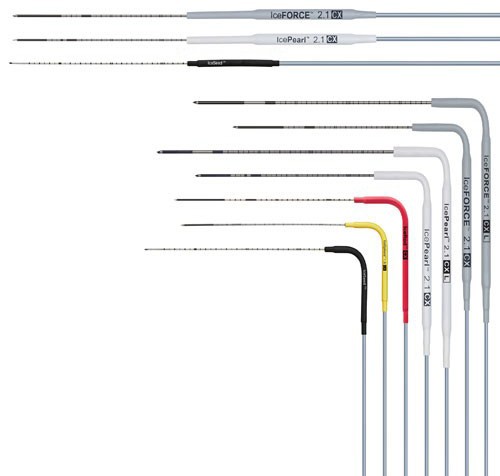2.1 CX Needles
CONTRAINDICATIONS
There are no known contraindications specific to use of the Galil Medical 2.1 CX Cryoablation Needles.
POTENTIAL ADVERSE EVENTS
There are no known adverse events related to the specific use of the Cryoablation Needles. There are, however, potential adverse events associated with any surgical procedure. Potential adverse events which may be associated with the use of cryoablation may be organ specific or general and may include, but are not limited to abscess, adjacent organ injury, allergic/anaphylactoid reaction, angina/coronary ischemia, arrhythmia, atelectasis, bladder neck contracture, bladder spasms, bleeding/hemorrhage, creation of false urethral passage, creatinine elevation, cystitis, diarrhea, death, delayed/non healing, disseminated intravascular coagulation (DIC), deep vein thrombosis (DVT), ecchymosis, edema/swelling, ejaculatory dysfunction, erectile dysfunction (organic impotence), fever, fistula, genitourinary perforation, glomerular filtration rate elevation, hematoma, hematuria, hypertension, hypotension, hypothermia, idiosyncratic reaction, ileus, impotence, infection, injection site reaction, myocardial infarction, nausea, neuropathy, obstruction, organ failure, pain, pelvic pain, pelvic vein thrombosis, penile tingling/ numbness, perirenal fluid collection, pleural effusion, pneumothorax, probe site paresthesia, prolonged chest tube drainage, prolonged intubation, pulmonary embolism, pulmonary insufficiency/failure, rectal pain, renal artery/renal vein injury, renal capsule fracture, renal failure, renal hemorrhage, renal infarct, renal obstruction, renal vein thrombosis, rectourethral fistula, scrotal edema, sepsis, skin burn/frostbite, stricture of the collection system or ureters, stroke, thrombosis/thrombus/embolism, transient ischemic attack, tumor seeding, UPJ obstruction/injury, urethral sloughing, urethral stricture, urinary fistula, urinary frequency/urgency, urinary incontinence, urinary leak, urinary renal leakage, urinary retention/ oliguria, urinary tract infection, vagal reaction, voiding complication including irritative voiding symptoms, vomiting, wound complication, and wound infection.
1.5 Cryoablation Needles
CONTRAINDICATIONS
There are no known contraindications specific to use of a Galil Medical 1.5 (17G) Cryoablation Needle.
POTENTIAL ADVERSE EVENTS
There are no known adverse events related to the specific use of the Cryoablation Needles. There are, however, potential adverse events associated with any surgical procedure. Potential adverse events which may be associated with the use of cryoablation may be organ specific or general and may include, but are not limited to abscess, adjacent organ injury, allergic/anaphylactoid reaction, angina/coronary ischemia, arrhythmia, atelectasis, bladder neck contracture, bladder spasms, bleeding/hemorrhage, creation of false urethral passage, creatinine elevation, cystitis, diarrhea, death, delayed/non healing, disseminated intravascular coagulation (DIC), deep vein thrombosis (DVT), ecchymosis, edema/swelling, ejaculatory dysfunction, erectile dysfunction (organic impotence), fever, fistula, genitourinary perforation, glomerular filtration rate elevation, hematoma, hematuria, hypertension, hypotension, hypothermia, idiosyncratic reaction, ileus, impotence, infection, injection site reaction, myocardial infarction, nausea, neuropathy, obstruction, organ failure, pain, pelvic pain, pelvic vein thrombosis, penile tingling/numbness, perirenal fluid collection, pleural effusion, pneumothorax, probe site paresthesia, prolonged chest tube drainage, prolonged intubation, pulmonary embolism, pulmonary insufficiency / failure, rectal pain, renal artery/renal vein injury, renal capsule fracture, renal failure, renal hemorrhage, renal infarct, renal obstruction, renal vein thrombosis, rectourethral fistula, scrotal edema, sepsis, skin burn/frostbite, stricture of the collection system or ureters, stroke, thrombosis/thrombus/embolism, transient ischemic attack, tumor seeding, UPJ obstruction/injury, urethral sloughing, urethral stricture, urinary fistula, urinary frequency/ urgency, urinary incontinence, urinary leak, urinary renal leakage, urinary retention/ oliguria, urinary tract infection, vagal reaction, voiding complication including irritative voiding symptoms, vomiting, wound complication, and wound infection.
